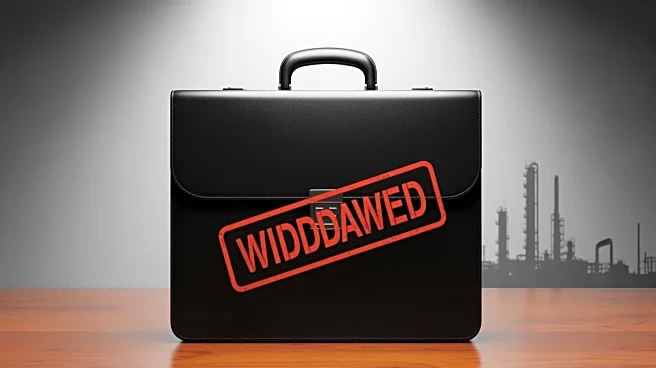What's Happening?
Gunvor, a major international commodities trading firm, has decided to withdraw its proposal to acquire the international assets of Russian oil company Lukoil. This decision follows allegations from the U.S.
government labeling Gunvor as 'the Kremlin's puppet.' The U.S. Treasury Department's Office of Foreign Assets Control (OFAC) had not yet approved the deal, which was contingent on such permission. Gunvor, headquartered in Geneva, announced its withdrawal on social media, countering the U.S. claims as 'fundamentally misinformed and false.' The company emphasized its transparency and distancing from Russian interests, having ceased trading in line with sanctions and sold off Russian assets. Gunvor was co-founded by Swedish oil magnate Torbjörn Törnqvist and Gennady Timchenko, an oligarch close to Russian President Vladimir Putin, though Timchenko is no longer affiliated with the company.
Why It's Important?
The withdrawal of Gunvor from the acquisition of Lukoil's assets underscores the significant impact of U.S. sanctions on international business dealings involving Russian entities. The U.S. government's stance reflects ongoing geopolitical tensions and its efforts to pressure Russia into ceasing its military actions in Ukraine. This development highlights the challenges faced by companies with historical ties to Russia in navigating international sanctions and maintaining business operations. The situation also illustrates the broader economic implications of geopolitical conflicts, affecting global oil markets and international trade relations. Companies like Gunvor, which have distanced themselves from Russian interests, must carefully manage their reputations and compliance with international regulations to sustain their operations.
What's Next?
Gunvor's decision to withdraw from the deal may lead to further scrutiny of its operations and those of other companies with historical Russian ties. The U.S. Treasury's firm stance suggests continued vigilance in enforcing sanctions, potentially affecting future business transactions involving Russian assets. Lukoil, seeking to divest its international holdings, may need to explore alternative buyers or strategies to comply with sanctions and mitigate financial impacts. The broader geopolitical landscape remains tense, with potential for further economic and diplomatic developments as the U.S. and its allies continue to respond to Russia's actions in Ukraine.
Beyond the Headlines
This situation raises questions about the ethical responsibilities of international businesses in conflict zones and the role of economic sanctions as a tool of foreign policy. The case of Gunvor and Lukoil illustrates the complexities of global trade in politically sensitive contexts, where companies must balance profit motives with compliance and ethical considerations. The long-term implications may include shifts in global energy markets and the strategic realignment of companies seeking to avoid entanglement in geopolitical disputes.










